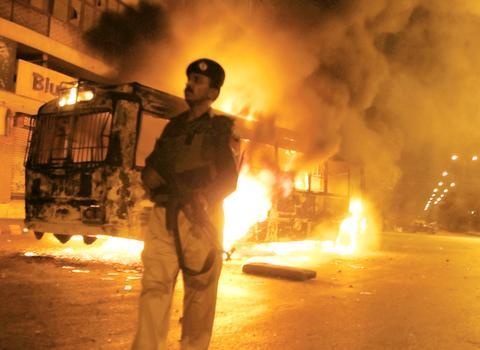President Pervez Musharraf was planning urgent measures yesterday to combat violence in Pakistan's largest city after a fifth bloody attack in a month left 19 people dead.
"He will make some important decision that can protect and save the lives of people and address the law-and-order situation," Information Minister Sheikh Rashid said, adding that he expected such an announcement in the next few days.
A blast by a suspected suicide bomber killed 19 worshippers during evening prayers at a Shiite Muslim mosque Monday. Over 15,000 police and paramilitary troops were already guarding Shiite centers and other sensitive areas following the murder of a senior Sunni cleric a day earlier.

PHOTO: AP
"We suspect it's a suicide attack," senior police investigator Manzoor Mughal said.
Sunni cleric Mufti Nizamuddin Shamzai, 70, was gunned down Sunday in the same area as the Ali Raza mosque that was attacked on Monday. Shamzai's assassination triggered violent riots Sunday, and authorities had feared a revenge attack against Shiites.
The latest spiral of Shiite-Sunni violence, which has killed over 4,000 people since the 1980s, erupted May 7 in Karachi, when the Shiite Haideri mosque was attacked by a suicide bomber. Twenty-three worshippers died.
Monday's mosque attack was the fifth within a month. As well as Shamzai's murder and the earlier Shiite mosque attack, a double car-bomb attack near the US consul-general's residence killed a police officer on May 26, while on May 25 two parcel bombs killed two people at Karachi's port.
The Sindh province police chief, Kamal Shah, described the surge in violence as a war between militants and police.
"This is a war between the law enforcement agencies and terrorists," Shah said.
"Police are after them and they are after the police. Many of the terrorists have been arrested but it's an ongoing war against terror."
More riots erupted through the night after Monday's attacks.
Three people were killed in shootouts between police and protesters, and rioters torched around 20 cars, Karachi police chief Tariq Jamil said.
Rashid denied that authorities had lost control of Karachi's 14 million people. The city has long been a haunt of drug traffickers, gun-runners, terrorists and warring gangs thrashing out ethnic, sectarian and political differences.
"We haven't lost control, but there is a lack of information and handling by the administration in Karachi," Rashid said.
Witnesses said Monday's explosion was so powerful that it caused cracks in the mosque's concrete dome.
Shiite leader Hasan Turabi said Shamzai's murder and the Shiite mosque attack were "an attempt to divide the two Muslim sects."
"There is no Shia-Sunni conflict and we will never allow the two sects to fight," he declared.
Musharraf was "gravely concerned" over deteriorating security in Karachi, Rashid said. No one has claimed responsibility for the bombing.

Indonesia yesterday began enforcing its newly ratified penal code, replacing a Dutch-era criminal law that had governed the country for more than 80 years and marking a major shift in its legal landscape. Since proclaiming independence in 1945, the Southeast Asian country had continued to operate under a colonial framework widely criticized as outdated and misaligned with Indonesia’s social values. Efforts to revise the code stalled for decades as lawmakers debated how to balance human rights, religious norms and local traditions in the world’s most populous Muslim-majority nation. The 345-page Indonesian Penal Code, known as the KUHP, was passed in 2022. It

‘DISRESPECTFUL’: Katie Miller, the wife of Trump’s most influential adviser, drew ire by posting an image of Greenland in the colors of the US flag, captioning it ‘SOON’ US President Donald Trump on Sunday doubled down on his claim that Greenland should become part of the US, despite calls by the Danish prime minister to stop “threatening” the territory. Washington’s military intervention in Venezuela has reignited fears for Greenland, which Trump has repeatedly said he wants to annex, given its strategic location in the arctic. While aboard Air Force One en route to Washington, Trump reiterated the goal. “We need Greenland from the standpoint of national security, and Denmark is not going to be able to do it,” he said in response to a reporter’s question. “We’ll worry about Greenland in

PERILOUS JOURNEY: Over just a matter of days last month, about 1,600 Afghans who were at risk of perishing due to the cold weather were rescued in the mountains Habibullah set off from his home in western Afghanistan determined to find work in Iran, only for the 15-year-old to freeze to death while walking across the mountainous frontier. “He was forced to go, to bring food for the family,” his mother, Mah Jan, said at her mud home in Ghunjan village. “We have no food to eat, we have no clothes to wear. The house in which I live has no electricity, no water. I have no proper window, nothing to burn for heating,” she added, clutching a photograph of her son. Habibullah was one of at least 18 migrants who died

Russia early yesterday bombarded Ukraine, killing two people in the Kyiv region, authorities said on the eve of a diplomatic summit in France. A nationwide siren was issued just after midnight, while Ukraine’s military said air defenses were operating in several places. In the capital, a private medical facility caught fire as a result of the Russian strikes, killing one person and wounding three others, the State Emergency Service of Kyiv said. It released images of rescuers removing people on stretchers from a gutted building. Another pre-dawn attack on the neighboring city of Fastiv killed one man in his 70s, Kyiv Governor Mykola